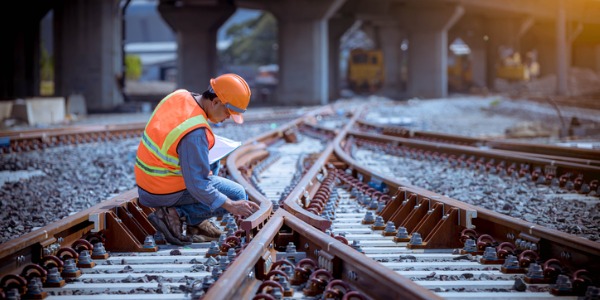What is a Railroad Inspector?
Railroad inspectors are professionals who are responsible for monitoring and ensuring the safety and efficiency of railroad infrastructure, including railroad tracks, bridges, signals, and other structures. With their extensive knowledge of railroad operations, industry regulations, and maintenance practices, these inspectors help identify potential hazards that could cause accidents or derailments. They play a critical role in preserving the integrity of the railway network and thereby minimizing risks to railroad workers, passengers, and the general public.
What does a Railroad Inspector do?

Duties and Responsibilities
While their responsibilities can vary depending on their specific role, location, and the condition of the railroad network for which they are responsible, the railroad inspector’s typical day involves some combination of the following:
- Inspection of railroad infrastructure – Railroad inspectors begin their day by inspecting the condition of railroad tracks, bridges, signals, and other infrastructure to ensure compliance with safety regulations and standards. They check for any damage, wear and tear, or other issues that could pose a potential hazard and compromise safety or efficiency.
- Record keeping – After conducting inspections, railroad inspectors record their findings, documenting any issues or recommendations for improvement.
- Meetings – Railroad inspectors may attend meetings with other members of the railroad management team to discuss their findings and recommendations, as well as to plan upcoming inspections and maintenance work.
- Investigating accidents or incidents – If there has been an accident or incident on the railway, the railroad inspector will investigate to determine the root cause and make recommendations to prevent similar incidents from occurring in the future.
- Worker oversight – If maintenance or repair work is scheduled, the railroad inspector oversees railway workers or contractors to ensure that their work meets the required standards.
- Training and education – Railroad inspectors may also be responsible for training railway workers on safety practices and procedures.
- End-of-day report – At the end of the day, the railroad inspector prepares a report detailing the inspections conducted, issues identified, and recommendations made.
Specializations
What railroad inspectors do on a day-to-day basis will also vary should they specialize in a particular area of railroad inspection. Here are some of the most common specializations:
- Track Inspector – specializes in inspecting and evaluating the condition of railroad tracks, including the rails, ties, ballast, and other track components
- Bridge Inspector – specializes in inspecting and evaluating the condition of railroad bridges, including their structural integrity and safety features
- Signal Inspector – specializes in inspecting and evaluating the condition of railroad signals, including their proper functioning and compliance with safety regulations
- Hazardous Materials Inspector – specializes in the transportation of hazardous materials by rail, including inspecting railcars and ensuring compliance with safety regulations
- Passenger Safety Inspector – specializes in inspecting and evaluating the condition of railroad passenger equipment, such as locomotives and passenger cars
- Freight Safety Inspector – specializes in inspecting and evaluating the condition of freight equipment, including railcars and their cargo, to ensure that they are being transported safely and efficiently.
Railroad inspectors have distinct personalities. Think you might match up? Take the free career test to find out if railroad inspector is one of your top career matches. Take the free test now Learn more about the career test
What is the workplace of a Railroad Inspector like?
In addition to working for railroad companies, railroad inspectors may also be employed by:
- Federal Railroad Administration (FRA) – The FRA is a government agency responsible for regulating and overseeing the safety and efficiency of the railroad industry in the US. It employs railroad inspectors to monitor compliance with safety regulations and standards and to investigate accidents and incidents.
- Consulting Firms – Consulting firms that specialize in railroad safety and efficiency may employ railroad inspectors to provide services to railroad companies and government agencies. These inspectors may conduct inspections, investigations, and provide other services to clients.
Here are some general features of the railroad inspector’s workplace:
- Outdoors – Railroad inspectors spend much of their time outdoors, conducting inspections. They work in all weather conditions, including extreme heat, cold, and precipitation.
- Travel – Railroad inspectors may travel frequently to different locations to conduct inspections and investigations. They may also be required to travel to attend meetings, training sessions, or conferences.
- Office Work – Railroad inspectors also spend some of their time in the office, preparing reports, documenting inspections, and communicating with other members of the railroad management team.
- Safety Gear – Railroad inspectors must wear appropriate safety gear while working, including hard hats, safety glasses, and reflective vests.
- Physical Demands – The job of the railroad inspector can be physically demanding. It involves walking long distances, climbing ladders or steep embankments, and standing for extended periods.
Railroad Inspectors are also known as:
Track Inspector
Railway Inspector